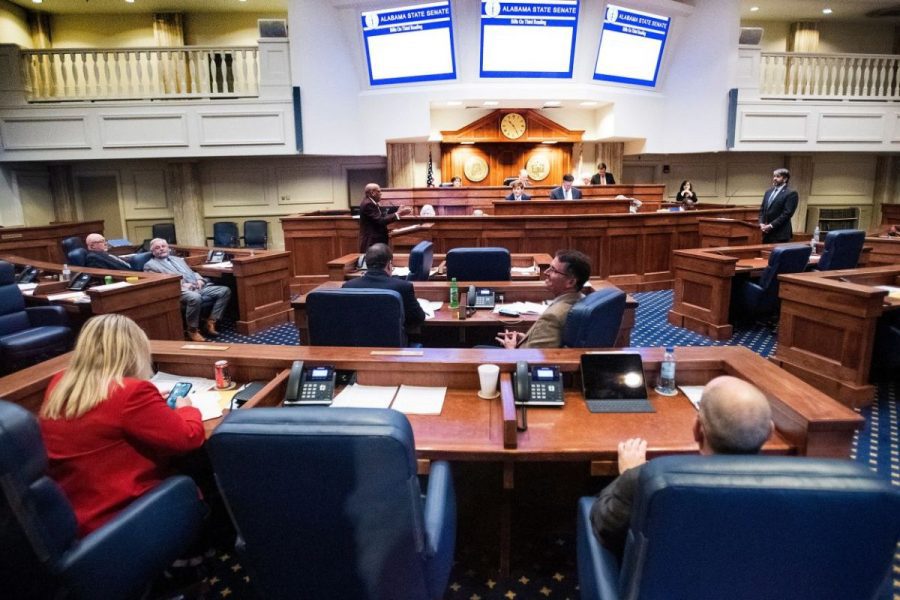Alabama Senate’s Controversial Bills: The Alabama Senate has advanced controversial bills to Governor Kay Ivey‘s desk for potential approval, sparking heated debates among legislators and the public. Senate Bill 1, introduced by Sen. Garlan Gudger, R-Cullman, aims to prohibit payments for assistance in absentee ballot applications and the distribution of pre-filled absentee ballots. Despite facing opposition, the bill managed to pass with a vote of 24-5, showcasing a divided stance on the issue within the Senate.
Similarly, Senate Bill 129, sponsored by Sen. Will Barfoot, R-Pike Road, focuses on restricting the use of public funds for Diversity, Equity, and Inclusion (DEI) efforts. The bill also outlines prohibited ‘divisive concepts’ that public employees cannot compel others to accept. This bill saw a vote of 25-4 in favor of its passage, indicating a strong push towards regulating how public funds are allocated for DEI initiatives in the state.
The passage of these bills highlights the contentious nature of the topics at hand and underscores the divergent perspectives within the Alabama Senate.

ALSO READ: Alabama’s Shocking Bill Bans Diversity in Schools
Criticism Surrounds Controversial Bills
Amid the passage of Senate Bill 1 and Senate Bill 129 by the Alabama Senate, significant criticism has emerged from diverse stakeholders regarding the implications of these controversial pieces of legislation. SPLC Action Fund Alabama Policy Director Jerome Dees condemned SB 1 as ‘one of the most egregious voter restriction bills since the Civil Rights era,’ highlighting concerns about criminalizing charitable acts related to absentee voting. The ACLU of Alabama labeled both bills as a ‘blow’ to civic groups, students, and Alabamians, expressing apprehension about their potential impact on free speech and academic freedom.
Concerns raised about criminalizing charitable acts related to absentee voting. Fear of restrictions impacting free speech and academic freedom. Criticism on the potential negative effects on civic groups and students. Comparison of SB 1 to voter restriction bills from the Civil Rights era
Senate Democrats React to Passage of Bills
Senate Democrats have expressed strong reservations about the recently passed bills in Alabama, citing concerns over their necessity and potential suppressive effects.
Senate Minority Leader Bobby Singleton, D-Greensboro, voiced opposition to both bills, highlighting their perceived lack of need and the potential for suppressive outcomes. Despite amendments that mitigated some impacts of SB 1 on absentee ballot applications, Singleton remains apprehensive about SB 129’s implications for higher education and the state’s business environment. He specifically cautioned against deterring future investments by major companies in Alabama due to the bill’s provisions.
Singleton’s stance underscores a broader Democratic concern regarding the bills’ overall effects on voting rights, education, and economic development in the state.
As the bills progress towards the governor’s desk, these reservations from Senate Democrats indicate a deep-seated unease about the potential consequences of these legislative measures on various aspects of Alabama’s social and economic landscape.

News in Brief
Alabama Senate sends controversial bills SB1 and SB129 to Governor Kay Ivey’s desk. SB1, passing 24-5, aims to restrict absentee voting assistance payments. SB129, passing 25-4, limits public funds for Diversity, Equity, and Inclusion (DEI) efforts.
Criticism from SPLC Action Fund Alabama Policy Director and ACLU of Alabama highlights concerns over voter restrictions and impacts on civic groups and students. Senate Democrats voice reservations, cautioning against suppressive effects and potential deterrence of investments. Passage of bills raises worries about implications on higher education, business environment, and state attractiveness for investments.

